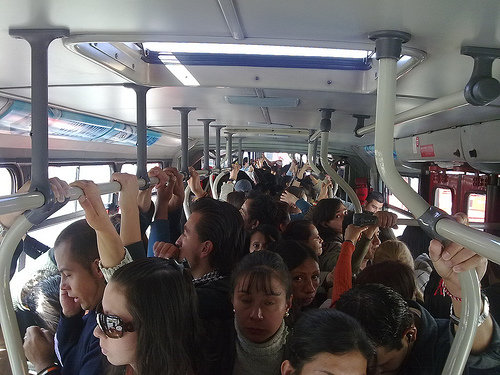Gender equality in Bogota: double standards?
The other day, I was on the TransMilenio bus going down the séptima (7th Avenue) on my way to the Museum of Modern Art on my day off, when something happened which got me thinking about gender equality in Bogota, and in Colombia generally.

A common scene on the TransMilenio bus
The bus was full, as usual, so I was standing. To give you some context, in Bogota, people can be pretty relaxed about certain rules or etiquette (such as paying for a bus ticket, or joining a queue..) but in certain specific situations they’ll play it exactly by the book. For example, if an obviously pregnant woman or an older person or someone with a child boards a bus, it is absolutely expected that if you don’t also fall into one of these categories yourself, you should vacate a blue priority seat and let said person sit down. Other people on the bus will advocate for these people if necessary, poking someone on the shoulder (and they will poke you hard – trust me!) and asking them to give up their seat for the needier person.
Right; so I was on this bus when a 60-something-year-old woman got on. This wasn’t a woman who looked like she was having difficulty standing, or with any other obvious disability; she merely looked older or more female than those sitting in the blue priority seats. As the woman moved through the bus, a young woman standing near me asked another young woman sitting in a blue seat if she’d give up her seat for the older woman. “I’m pregnant” she replied (it wasn’t immediately obvious by looking at her, but she was wearing a heavy coat); so the woman-advocate turned to the 60-something-year-old man sitting next to the pregnant lady and asked if he’d give up his seat instead then. Under the gaze of various people on the bus, the man dutifully, but clearly not very happily, relinquished his seat to his female contemporary, who took it without so much as a smile, let alone a ‘thank you’. My immediate thought was: “Why is a 60-something-year-old woman deemed more deserving of a seat on the bus than a man of the same age?” As I was pondering this thought, Woman-Advocate’s male companion sneered at the Pregnant Lady and muttered under his breath “Yeh, like one-month pregnant!” I wanted to say “Who are you to judge?? Don’t you know that the first trimester is often when a woman feels worst? Nausea, dizziness, exhaustion…” But I kept my mouth shut, as the next stop was mine.
As I got off the bus I couldn’t help but wonder: Where’s the compassion towards others, Bogota? In such a devoutly Catholic country I’m surprised that I don’t observe more people ‘loving thy neighbour’. But more pressingly, I questioned the double standards vis-à-vis gender equality. Women’s rights are currently a hot issue in Colombia, with women expecting and demanding the same treatment and benefits as men, as well they should; but many women seem to feel that the appropriate way to compensate for generations of female oppression is by taking advantage of their gender whenever it is convenient for them, such as expecting preferential treatment when taking a seat on the bus, or pushing men out of the way to reach the front of a queue…These women may consider themselves feminists, fighting for female empowerment. But as I understand it, although feminism is about the empowerment of women, this shouldn’t be at the expense of gender equality; feminism advocates that women should have the same social, political, and all other rights as men – not that women’s rights should always be put ahead of men’s. Gender equality isn’t just supposed to benefit women.
Of course this is a complex and controversial issue in Colombia, a country still in the midst of a decades-long armed conflict, and which is still dealing with the problem of domestic violence, a huge issue in Latin America in general. It was only a generation ago that girls and young women in Colombia were being warned by their mothers that they’d better learn how to cook well or their future husbands would beat them (a real anecdote told to me by a Colombian woman I know), and to the present day, violence against women persists: in 2012, 47,620 women reported being attacked by their partner or ex-partner; 18,100 women reported being the victims of sexual violence; and 138 women were murdered by their partner or ex-partner. It is therefore admirable that women are coming out in force to fight against violence, often at great risk to their own safety; during the first half of 2013, 44 female human rights defenders were attacked, and 5 murdered.*
But somehow I think that in order to achieve real, sustainable and positive change, the focus needs to shift from women’s rights to gender equality – meaning that both/all genders should be equal to each other. No, men have not suffered the same historical oppression as women, but nor do two wrongs make a right; by granting women advantages over men in common daily scenarios as trivial as who gets a seat on the bus, Colombia is perpetuating the tensions which exist between the sexes, provoking a sense of injustice in men, and potentially therefore a further damaging resentment.
I’ll leave you with a funny true anecdote that a friend told me once: a woman gets on the TransMilenio bus and all of the seats are taken. She looks up and down the bus expectantly for a few moments before loudly demanding: “What’s going on here?? Aren’t there any gentlemen on the bus??” and someone replies “No, it’s not that – there just aren’t any seats!”
*Statistics taken from Semana, ‘Cifras de la violencia contra la mujer’ 25/11/2013 http://www.semana.com/nacion/articulo/cifras-de-la-violencia-contra-la-mujer-en-colombia/366030-3





Leave a comment